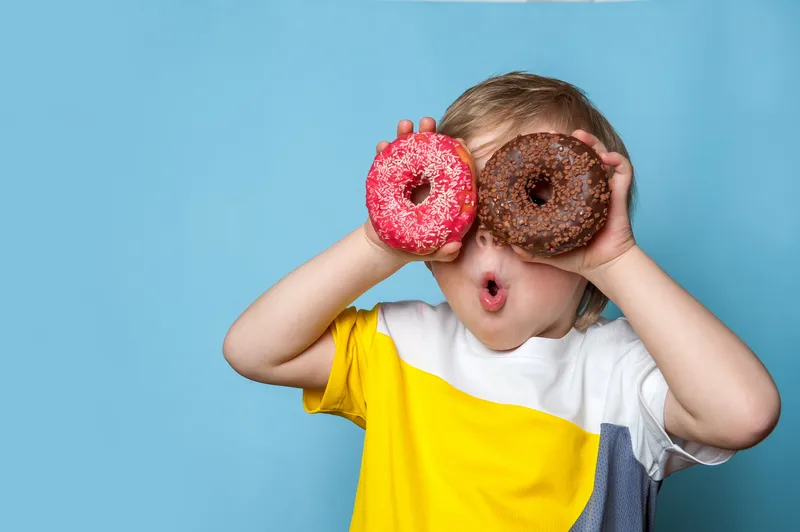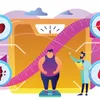Childhood obesity: Tough love to the rescue
It is very easy to just give in to children’s demands for highly inflammatory foods, but the more a child becomes obese, the more their confidence is impacted. Showing some tough love today is a gift that will serve them well in the future.
Globally, there is so much awareness on obesity. But many of us fail to bring conscious attention to a growing world epidemic, which is the loop that children are caught in. I’m talking about the loop of poor foods that have a highly addictive nature, obesity, depression, craving and the inability to break free from the cycle.
Parents are helpless and many parents struggle with internal battles, where they cannot say no. What is the solution? Is it to let your child stay addicted to these foods that make them obese and ignore the problem just for today? Or is it to show some tough love today so that we provide them with the tools that they need to stay balanced in the future?
The answer to this is very tricky. I know that as a mother, it is very easy to just give in to demands from my child for the highly inflammatory foods, especially as I struggle to navigate my time as a mom and as a professional. But would my convenience today be part of the reason why my child may struggle with physical and mental health in the future? You bet it would be.
What are the signs that your child is caught in the unhealthy spiral?
Children are not naturally unhealthy. Typically, a child is exposed to the foods from part of their culture, and most of them eat quite healthy until they get to school. Are schools to be blamed? To an extent. What is the pattern that happens over time?
1. A toddler is only exposed to simple home food, and most homes do not begin by introducing processed foods. Sometimes it does happen, but usually, when kids get to school, they are exposed to tuck shops, snacks brought by other kids which include chips and pastries, and the processed foods that are served in several international school cafeterias.
2. Processed foods are addictive in nature. One could go into the physiological addiction they create, ingredient by ingredient. However, the main thing to consider is that glutamates, sugars, and gluten are all addictive in nature. Sugar has been found to be as addictive as heroin in some research. Gluten occupies opiate receptors in the brain. The result is that a poor child has no option but to crave these foods.
3. The more a child becomes obese, the more their confidence is impacted. Some of them feel scared to go to school because they are ridiculed by their peers. We can absolutely support them by talking about it, by speaking with their school and teachers to address this form of bullying, and by having them counselled if it is required. This does not mean we should not encourage a change from these habits which are eventually at the root of all of this.
The common pattern is all or nothing. This need not be the case. Do provide your child with all the resources and support required to address their insecurities, lack of confidence, and depression. On the other side, they are never too young or too old to be guided on why something is harmful, and how it is important to make a change.

How can the process be easier for your child?
Believe it or not, every child has great potential for inner resilience. As parents, we may tiptoe around on eggshells, because we are afraid that they cannot handle change. The most important aspect to remember is that change does not happen overnight.
1. Change does not happen easily if you force your child to eat simple home food instead of all the fast food and processed food that they are used to. It begins with you making some of their favourite forms of food interesting but in a slightly healthier form. The continuum is always to move from a highly inflammatory diet to just one that is almost the same but with whole food options. This can include swapping a pizza for a whole wheat version, or a cheese toast with a whole wheat sandwich with some vegetables and a little cheese.
2. Ask your child what is most important to them. If losing weight is a big motivating factor, use that to create a vision for themselves. For some, it might be to not have pimples.
3. Most kids who are obese and struggle with food cravings, have suboptimal protein. You could even begin with no change in the diet, and just asking them to have a protein shake at breakfast. The moment they have string protein in the morning, the whole day their blood sugar will behave better. This means that they do not need to force themselves to try, and use will power to control themselves. Using willpower means that they will ultimately set themselves up to fail, and then feel bad, guilty, or more depressed.
4. Most cravings are also in the spiral of diets which are high in grain. Encourage them to have some vegetables in any form that they like, alongside their usual meal when they start to make changes. The additional fibre will offset some of the blood sugar imbalance. Give them a choice. Tell them that they can have their sandwich if they also have the roast vegetables.
5. Encourage them to point out the protein at every meal. You’ll be surprised how many children are confused about what constitutes protein. If they have a demand for you, have a demand for them. Make it fun, gentle, conversational, and encouraging.
6. Accept that there will be days when they get frustrated, with you, themselves, and the world in general. On those days, put aside all your rules, and give into their demands. But make it clear later, how food affects physiology and mood. There will be times that you take two steps forward and one step back. Managing this with your child is a lot like playing a game of snakes and ladders. Be kind to them and to yourself. One setback is not a failure.
Are you helping your child long term?
Showing some tough love today is the greater love. Love is not giving in to every demand for the worst food daily. Be prepared to have some battles, to have your child dislike you on many days, and to feel discouraged. However, always look at the bigger picture. Ultimately, showing your child the right tools and the right path, is a blessing to them. It is a gift that will serve them well sometime in their life, whenever and wherever that might be.
Edited by Anju Narayanan








